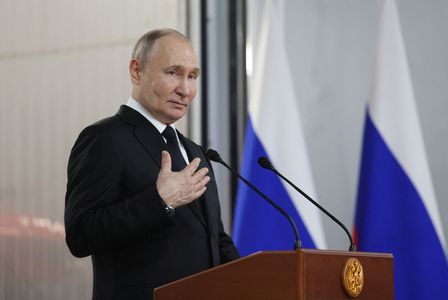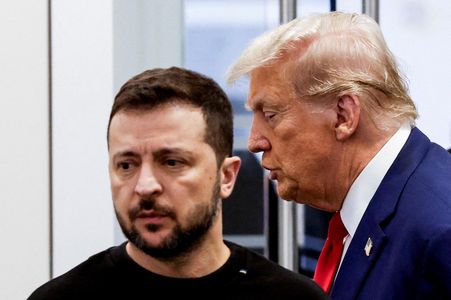President Trump abruptly fired the chairman of the Joint Chiefs of Staff, Air Force Gen. CQ Brown, on Friday. The panel discusses what the president's move means for the U.S. military.
Clip: What Trump's firing of the Joint Chiefs chairman means for the military
Feb. 21, 2025 AT 9:03 p.m. EST
TRANSCRIPT
Notice: Transcripts are machine and human generated and lightly edited for accuracy. They may contain errors.
Jeffrey Goldberg: There was a time when America could be counted on to support the goals of the NATO alliance. And that time was, technically, at least, last week. This week, America's allies in Europe, partnerships that were formed in the aftermath of World War II, have been left wondering if they'll ever be able to count on America again. And they're not the only ones. From East Asia to the Middle East, from Panama to South Africa, leaders are scrambling to understand Trump's wishes and desires.
I'll scramble tonight as well with my guests Peter Baker, the chief White House correspondent at The New York Times, Susan Glasser is a staff writer at the New Yorker, and Jonathan Lemire is a contributing writer at The Atlantic, as well as co-host of Morning Joe on MSNBC. Thank you all for joining me.
We have news just as we were coming on set. President Trump has fired the chairman of the Joint Chiefs of Staff, General C.Q. Brown, Air Force general, four star general, second black chairman of the Joint Chiefs of Staff. Jonathan, surprising that he would fire on?
Jonathan Lemire, Contributing Writer, The Atlantic: No not at all, even though it's unconventional. Traditionally these are roles the chairman stays through presidencies but we heard from Pete Hegseth, the new defense secretary, some weeks ago saying that he said General Brown should be fired. This was before Hegseth was confirmed to the post because Brown was too focused on the woke policies of diversity, equity, inclusion, DEI, which we know President Trump to this point has really targeted across federal agencies, including at the Pentagon.
So, this was something that had been widely expected would happen the next couple of weeks. It happened moments ago.
Jeffrey Goldberg: All right. Peter, what does it mean for the military that they fired a general very relatively quickly into his term?
Peter Baker, Chief White House Correspondent, The New York Times: Well, look, President Trump in his first term tried to assert control over the military in a way that went beyond what the normal commander-in-chief does, not just, as you know, a defense for the country against external enemies but as a tool potentially for internal use when he had domestic criticism. And that's where he got into a fight, as you've written and we've written, and you've written, and we've all written, with Mark Milley, the previous chairman of the Joint Chiefs, who resisted what he thought were at times certainly unwise, maybe illegal and unconstitutional desired by the president to put troops in the streets.
So, clearly there's a decision that C.Q. Brown is not somebody that he can trust to carry out his bidding. And we don't know what that bidding will be.
Jeffrey Goldberg: And you think that it's the acid test for Trump is willingness to put troops in the streets against American citizens?
Peter Baker: It would be striking, no, if he had not made a conversation about the Insurrection Act a part of any interview for who was going to take his place.
Jeffrey Goldberg: Right. And, Susan, one more question on this. C.Q. Brown was characterologically or dispositionally very, very different than his predecessor, General Mark Milley. Milley got into trouble with Trump for speaking his mind pretty loudly. C.Q. Brown, one of the most cautious generals, flag officers that probably all of us have ever met, very deliberate, very careful, very quiet, didn't save him.
Susan Glasser, Staff Writer, The New Yorker: No, it didn't save him. Donald Trump has made it very clear that he wants people who are loyal to him personally and not to the office, not to the Constitution. And I'm looking for, Jeff, to understand whether this is just one firing or whether we're going to see a wholesale purge of generals, as a number of news outlets have been reporting.
And I think that's of deep concern when you look at Trump's agenda. It really suggests a politicization of the nonpartisan leadership of America's armed forces, if generals are being replaced on the basis of perceived political loyalty to the president. And I think, remember, again, the U.S. Congress has a role in this. The Senate has to confirm Trump's new chairman of the Joint Chiefs, and I think it's an appropriate set of questions for them to ask as to why has this -- apparently a three star general been elevated to this position and what questions were asked of him by Donald Trump.
Jeffrey Goldberg: So, I think we're going to be talking about the Insurrection Act in the coming weeks in a way that we maybe didn't think we were going to be, but we'll obviously stay on top of that next week.
FROM THIS EPISODE


Clip: What's behind Trump's pivot toward Putin


Full Episode: Washington Week with the Atlantic full episode, 2/21/25

© 1996 - 2026 WETA. All Rights Reserved.
PBS is a 501(c)(3) not-for-profit organization
